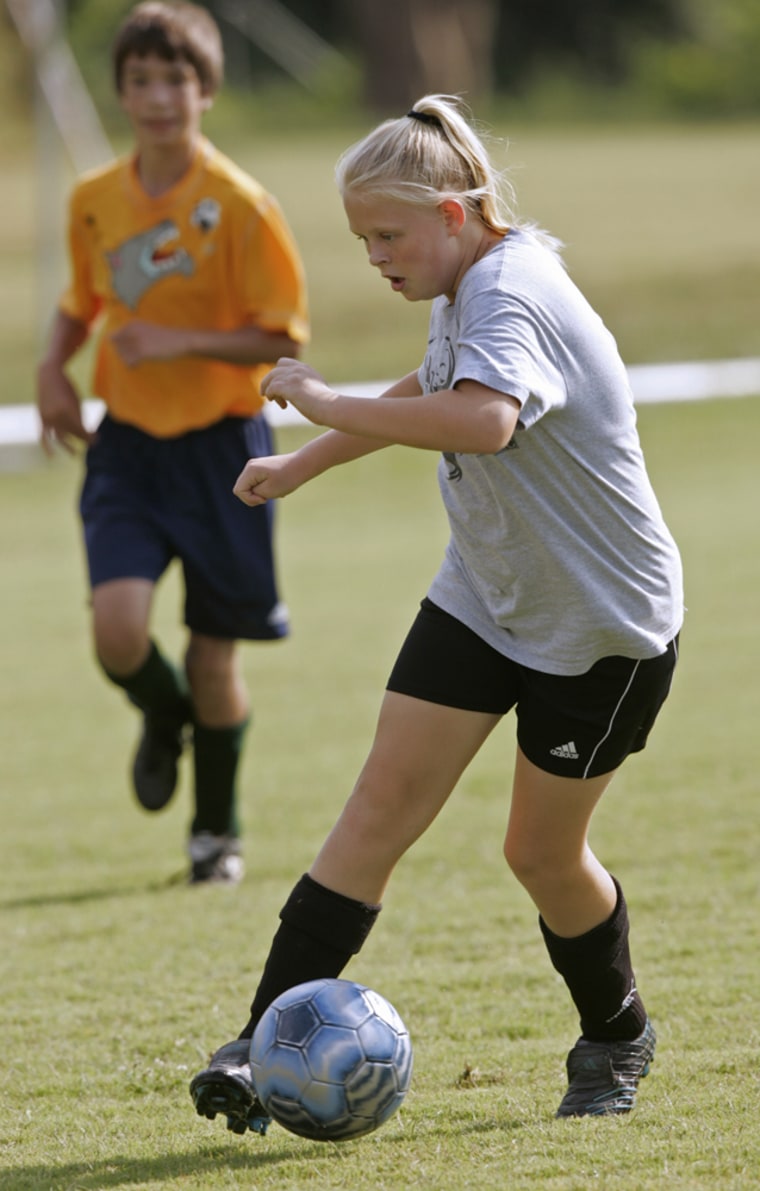Soccer is good exercise, good for developing coordination and just good fun, but if David Haase wants his sixth-grader to play it at school, he'll have to come up with $135 to make it happen.
What will he get for his money? The use of a uniform for 11-year-old Morgan, and the privilege for her to attend practice. He must also supply a ball, cleats and shin guards if she wants to join the team at Karns Middle School in Knoxville, Tenn.
"It may get expensive, but I would rather give up something myself than I would give up something for our child," he said. "Those school activities are so important to a child's growth."
While parents have always had to pay for private piano lessons and cough up Little League fees, such pay-to-participate and pay-to-play charges imposed by public schools around the country are on the rise, often as a worst-case alternative to canceling activities altogether in the bad economy.
The practice has gone up and down since the recession-tainted 1970s. A 2004 USA Today survey found 34 state high school associations required participation fees. Now, dozens of cash-strapped school districts are relying on them to supplement squeezed budgets and fatigued PTAs.
$50 for this, $100 for thatIn May, the board of education in Hartford, Conn., approved a budget that relies on parents paying $100 in participation fees, with a $200 yearly cap and a family cap of $400. In Manchester, N.H., schools are considering charging parents $50 to $100 for extracurricular activities per child.
Parents in Richmond Heights, Ohio, may have to pay up to $1,000 in fees next school year. It will cost $350 for a student to participate in a sport, band, choir or cheerleading. The charge for other activities, including the National Honor Society, will be $100.

Robert Kanaby, director of the National Federation of State High School Associations, which counts more than 7.3 million participants in school sports around the country, said the trend is disturbing but still better than the alternative — dumping athletics and other activities for lack of money.
"The educational value in school sports in incredible," he said. "We believe it's an important part of growing and maturing."
Others in school athletics agree, but they said fees in schools not only sting parents. They put coaches and kids in tough spots, too.
Jerry Snodgrass, an assistant commissioner for the Ohio High School Athletic Association and the former athletic director at Findlay High School, where Pittsburgh Steelers quarterback Ben Roethlisberger played, posed this predicament: If a benched student pays to be on the team, should he or she be guaranteed significant game time over starters?
"Your mindset may become, I'm an eighth man on a team, I'm not going to play that much so what's the point?" Snodgrass said. "Schools can really struggle with their numbers."
Bake sales, jewelry sales, walkathonsSome parents have banded together for a slightly different approach to paying fees per child or per family.
Last year, parents in the Wantagh school district on New York's Long Island mobilized under a threat to cut extracurricular activities. A dad, Don Desroches, led the charge, raising more than $650,000 for sports, music and drama. The fundraising took a few months and included endless bake sales, walkathons and jewelry sales. As a result, the activities stayed.
"You name it, we did it," Desroches said. "We really had no other choice."
When the budget passed this year, there was no threat of cancellation, Desroches said.
Relying on parents in bad economic times sometimes becomes the norm in a school as families resign themselves to paying extra year after year, Kanaby said.
"In some situations schools are charging students to participate regardless, a practice that's accepted ... from class to class and generation to generation," he said.
That's what happened at Karns Middle School, said Haase, who mentors student athletes at the University of Tennessee. The soccer fee was in place at Morgan's school when he moved to the area years ago from New York, and parents have accepted it as part of life, he said.
"I think a lot of parents have just gotten so accustomed to it," Haase said. "You're going to pay for it and you'll make the sacrifices of other things, in some other area."
For Morgan, it means the chance to play sixth grade soccer and hone her midfielding skills.
"She really loves to play," Haase said. "And that's important."